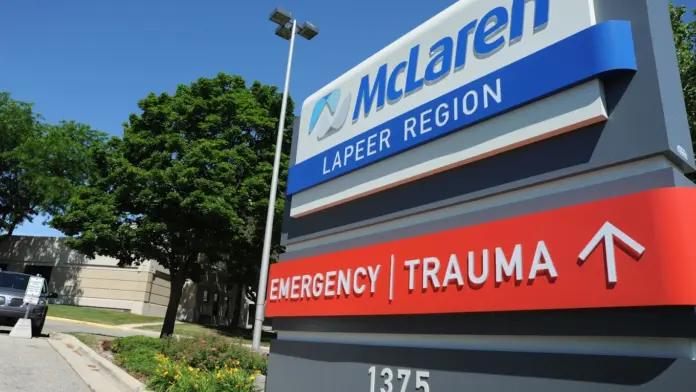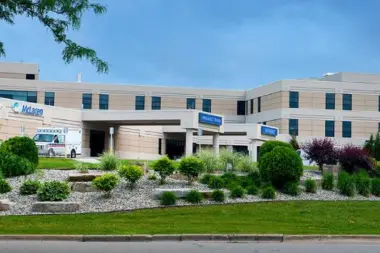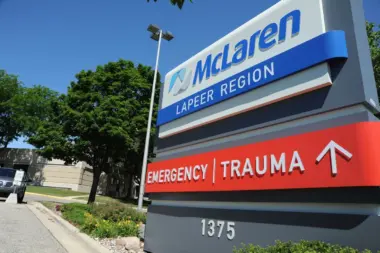About McLaren Lapeer Region
McLaren Lapeer Region is an acute care hospital that has 222 beds and provides health care services to residents of Lapeer, Michigan. Individuals struggling with a primary mental health disorder including those with co occurring drug or alcohol addiction can receive treatment through the partial hospitalization psychiatric program. The hospital accepts Medicaid and Medicare as payment options.
An Alternative To Inpatient Hospitalization
The partial hospitalization psychiatric program allows patients to receive treatment without having to stay at the hospital. It’s also a suitable option for clients who are stepping down from inpatient mental health care. A case manager will work with you to assist with follow up appointments, suggest methods for meeting treatment goals, and ensure that you’re getting the appropriate care.
Additional staff that will be assisting you throughout the treatment program include certified recreation therapists, psychiatrists and teachers. You’ll have a daily consultation with a physician. I like that the facility will use a variety of therapeutic approaches to help you achieve healing from addiction.
The approaches that may be used in your treatment include recreational therapy, expressive therapy and anger management. Recreational therapy can involve doing activities such as meditation, yoga, and outdoor exercise. This type of therapy exposes you to alternative ways you can manage your stress without having to use substances.
Maintaining Sobriety in a Small Town
With Lapeer being a small town, you have a peaceful, quiet setting with few distractions so you can focus on continuing your recovery. There are also different fun activities to do in town, such as spending a day at Torzewski County Park, which features a water park, nature trails and a lake for fishing.
Facility Overview
Latest Reviews
Rehab Score
Gallery




Other Forms of Payment
Private insurance refers to any kind of healthcare coverage that isn't from the state or federal government. This includes individual and family plans offered by an employer or purchased from the Insurance Marketplace. Every plan will have different requirements and out of pocket costs so be sure to get the full details before you start treatment.
Self-pay involves paying for treatment out of your own pocket. You can use savings or credit, get a personal loan, or receive help from family and friends to fund your treatment. If you don't have insurance or your insurance plan doesn't cover a specific program, self-pay can help ensure you still get the care you need.
Financial aid can take many forms. Centers may have grants or scholarships available to clients who meet eligibility requirements. Programs that receive SAMHSA grants may have financial aid available for those who need treatment as well. Grants and scholarships can help you pai for treatment without having to repay.
Medicare is a federal program that provides health insurance for those 65 and older. It also serves people under 65 with chronic and disabling health challenges. To use Medicare for addiction treatment you need to find a program that accepts Medicare and is in network with your plan. Out of pocket costs and preauthorization requirements vary, so always check with your provider.
Military members, veterans, and eligible dependents have access to specific insurance programs that help them get the care they need. TRICARE and VA insurance can help you access low cost or no cost addiction and mental health treatment. Programs that accept military insurance often have targeted treatment focused on the unique challenges military members, veterans, and their families face.
Medicaid is a state based program that helps lower-income individuals and families pay for healthcare. Medicaid covers addiction treatment so those enrolled can use their coverage to pay for rehab. When a program accepts Medicaid the client often pays very little or nothing out of their own pocket.
Addiction Treatments
Levels of Care
Residential treatment programs are those that offer housing and meals in addition to substance abuse treatment. Rehab facilities that offer residential treatment allow patients to focus solely on recovery, in an environment totally separate from their lives. Some rehab centers specialize in short-term residential treatment (a few days to a week or two), while others solely provide treatment on a long-term basis (several weeks to months). Some offer both, and tailor treatment to the patient's individual requirements.
Treatments
Mental health rehabs focus on helping individuals recover from mental illnesses like bipolar disorder, clinical depression, anxiety disorders, schizophrenia, and more. Mental health professionals at these facilities are trained to understand and treat mental health issues, both in individual and group settings.
Programs
Adult rehab programs include therapies tailored to each client's specific needs, goals, and recovery progress. They are tailored to the specific challenges adult clients may face, including family and work pressures and commitments. From inpatient and residential treatment to various levels of outpatient services, there are many options available. Some facilities also help adults work through co-occurring conditions, like anxiety, that can accompany addiction.
Young adulthood can be an exciting, yet difficult, time of transition. Individuals in their late teens to mid-20s face unique stressors related to school, jobs, families, and social circles, which can lead to a rise in substance use. Rehab centers with dedicated young adult programs will include activities and amenities that cater to this age group, with an emphasis on specialized counseling, peer socialization, and ongoing aftercare.
Clinical Services
Cognitive behavioral therapy in Michigan helps participants view challenges more clearly so they can respond to them in healthy ways. During a limited number of structured sessions, clients learn about and practice these changes to effectively address substance use and mental health disorders.
Addiction often involves intense situations and emotions. Dialectical behavior therapy helps you understand and regulate your emotions and better manage the situations that evoke those feelings. You'll receive mindfulness training and stress management training to cope more effectively with difficult emotions.
Group therapy sessions in Michigan allow you to share responsibility with your peers in a group setting. This fosters a collective commitment to achieve sobriety and learn coping skills that are essential to improving your relationships and reducing your stress levels.
In individual therapy, a patient meets one-on-one with a trained psychologist or counselor. Therapy is a pivotal part of effective substance abuse treatment, as it often covers root causes of addiction, including challenges faced by the patient in their social, family, and work/school life.
Quitting smoking is tough without the proper support. A good quit plan often includes nicotine replacement therapy. These products allow your body to adjust to a lack of nicotine, so you experience fewer cravings and less intense withdrawal symptoms.
Amenities
-
Private Setting
Staff

Philip A. Incarnati
President & CEO

Tim Vargas
President/CEO

Chad M.Grant
Executive VP & COO

Justin Klamerus, MD, MMM
Executive VP & Chief Clinical Officer

Dave Mazurkiewicz
Executive VP & CFO

Jennifer M. Montgomery, MSA, RN, CENP, NEA-BC, FACHE
Senior VP & Chief Nursing Officer

Derek Morkel
CIO

Carissa Burton
Senior VP Human Resources

Michael Lacusta
Senior VP Business Development
Contact Information
1375 North Main Street
Lapeer MI, 48446